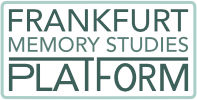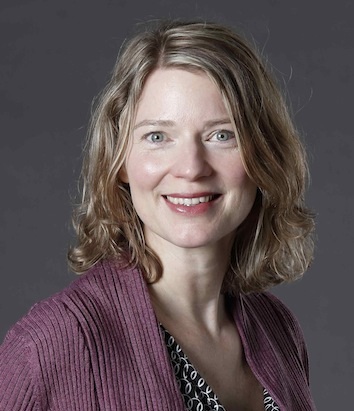Astrid Erll is Professor of Anglophone Literatures and Cultures at Goethe-University Frankfurt. She has worked on German, British, South Asian, American, and South African literatures and media cultures. Her research interests include literary history (focus on 19th-21st centuries), media history (focus on film and photography), English and comparative literature, cultural theory, media theory, narratology, transcultural studies and – last not least – memory studies.
Astrid Erll is general editor of the book series Media and Cultural Memory (with A. Nünning, De Gruyter, since 2004) and co-editor of A Companion to Cultural Memory Studies (with A. Nünning, 2010) and Mediation, Remediation, and the Dynamics of Cultural Memory (with A. Rigney, 2009). More recently, she published with Ann Rigney Audiovisual Memory and the (Re)Making of Europe(Image & Narrative, 2017) and Cultural Memory after the Transnational Turn (Memory Studies, 2018). She is author of Memory in Culture (Palgrave 2011), an introduction to memory studies which was originally published in German as Kollektives Gedächtnis und Erinnerungskulturen (2005, 3rd ed. 2017) and has also been translated into Chinese, Spanish, and Polish.
In 2011, Astrid Erll founded the Frankfurt Memory Studies Platform, a vibrant forum for memory studies across the disciplines, connecting researchers both in Frankfurt and internationally.
In 2016, she received a research grant from the VolkswagenStiftung for an „Opus Magnum“ on the reception of Homer as cultural memory (“Odyssean Travels: A Literary History of Cultural Memory“).
Projects:
TraCe – Research Center “Transformations of Political Violence”: Principal Investigator and Co-Speaker
Transnational Flashbulb Memories. James S. McDonnell Foundation: “Collective Memory Research Group”. Co-PI with Magdalena Abel (University of Regensburg), William Hirst (New School for Social Research), and Piotr Szpunar (University at Albany, SUNY)
VW Opus Magnum “Odyssean Travels. A Literary History of Modern Memory“
Migration and Transcultural Memory: Literature, Film, and the Social Life of Media
AFRASO – The Indian Ocean as Memory Space
Key Publications:
“The Hidden Power of Implicit Collective Memory.” Memory, Mind & Media 1, e14 (2022) 1–17. https://doi.org/10.1017/mem.2022.7
“Jenseits des Erwartungshorizonts: Pandemie und kollektives Gedächtnis.” Aus Politik und Zeitgeschichte: Geschichte und Erinnerung APuZ (40–41) 2021: 42-29.
“Travelling Narratives in Ecologies of Trauma: An Odyssey for Memory Scholars”. Special Issue on Cultural Trauma, ed. by William Hirst. Social Research 87.3 (2020): 533-563.
Memory Worlds in Times of Corona” Memory Studies 13 (2020) 5: 861-874. (Open Access https://doi.org/10.1177/1750698020943014), translation into Russian as: Астрид Эрлль. Миры памяти в эпоху коронавируса https://istorex.ru/New_page_77
Ed. with Ann Rigney: Cultural Memory after the Transnational Turn. Special Issue of Memory Studies 11.3 (2018).
“Homer: A Relational Mnemohistory.“ Special Issue of Memory Studies. Eds. Astrid Erll & Ann Rigney 11.3 (2018).
Ed. with Ann Rigney: Audiovisual Memory and the (Re-)Making of Europe. Special Issue Image [&] Narrative 18.1 (2017).
“Travelling Memory in European Film: Towards a Morphology of Mnemonic Relatedness.” Image [&] Narrative. Special Issue Audiovisual Memory and the (Re-)Making of Europe. Eds. Astrid Erll & Ann Rigney 18.1 (2017).
“Media and the Dynamics of Memory: From Cultural Paradigms to Transcultural Premediation.” The Oxford Handbook of Culture and Memory, ed. Brady Wagoner. Oxford: Oxford UP 2017. 305-324.
“Generation in Literary History: Three Constellations of Generationality, Genealogy, and Memory.” New Literary History45 (2014). 385–409.
“From ‘District Six’ to District 9 and Back: The Plurimedial Production of Travelling Schemata.” Chiara de Cesari & Ann Rigney (eds.): Transnational Memory: Circulation, Articulation, Scales. Berlin/New York: de Gruyter 2014. 29-50.
Memory in Culture. Basingstoke: Palgrave Macmillan 2011.
“Travelling Memory.” Parallax. Special Issue Transcultural Memory. Ed. Rick Crownshaw 17.4 (2011). 4-18.
“‘The Social Life of Texts’ – Erinnerungsliteratur als Gegenstand der Sozialgeschichte.” IASL 36.1 (2011). 255-259.
Email: erll@em.uni-frankfurt.de



